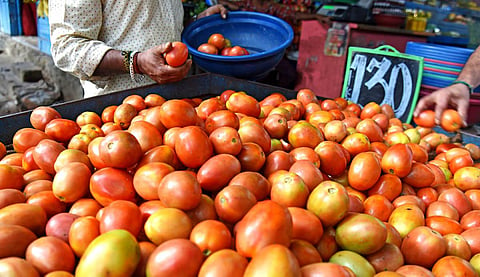Centre blames tomato price rise on untimely rains, disease and seasonality
The recent increase in tomato price is due to crop seasonality, white fly disease in Karnataka, fast spread of monsoon in North India and logistical disruption due to heavy rains, the Centre told Parliament on Monday in response to a question by MP Kalanidhi Veeraswamy.
The exchange comes in the wake of a steep increase in the price of some food items, particularly tomato, over the last several weeks.
The price of tomato, which used to be in the range of Rs 30-40 per kg, shot up to Rs 100-150 in most cities over the last three weeks.
While this has led to windfall gains for farmers, it has brought tears to consumers' eyes.
However, tomato was not the only food item to see a sharp run-up in prices in recent days, with pulses also seeing an increase -- though less spectacular -- in their prices.
However, said finance minister Nirmala Sitharaman, the prices of pulses -- the most widely consumed vegetarian food item in India after foodgrains -- rose "because of lower production".
She said the increase in prices was not because of a proportionate increase in the cost of agricultural inputs.
"...inflation in key agricultural inputs like fertilizers, insecticides and pesticides declined gradually from the previous year and remained low during the first quarter of 2023-24," Sitharaman said.
Remedial Measures
Sitharaman said the government has taken several steps to augment domestic availability and stabilize the prices of essential food items.
It has released onion and pulses from its buffer stock, imposed stock limits on traders, wholesalers and retailers, and has put in place monitoring of stocks declared by merchants and others to prevent hoarding.
She also said some changes have been made in trade policy, such as rationalization of import duty, changes in import quota and restrictions on exports of some commodities.
ALSO READ:

